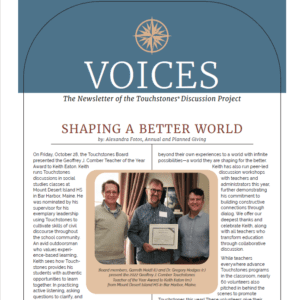My experience as an intern at Touchstones this summer was rich and fulfilling. I tried my hand at a variety of new projects: volunteering multiple times in a classroom setting at the Maryland Correctional Institution for Women (MCI-W), doing research on early childhood psychological development and literacy acquisition for curriculum aimed at 2nd graders, learning graphic design skills and becoming acquainted with platforms such as Canva and Buffer to contribute to Touchstones’ social media outreach. Additionally, without any prior experience in event-planning, I organized the annual summer staff-outing. We took a lovely trip to St. Michael’s, where we visited the Chesapeake Maritime Museum and held a pot-luck.
One great benefit of this internship was that I had the opportunity to become familiar with the procedures and norms of working in an office setting, which was quite an adjustment from my academic life as a student. Though the workload for my class is demanding, the 40-hour work week required a different sort of rigor. I had to develop the time management skills and flexibility to shuttle between multiple tasks every day and complete them in a timely manner. Above all, I can say with confidence that after having interned at Touchstones, I am more self-aware.
Coming into this internship as a student at St. John’s College meant that I was already acquainted with discussion-based learning, though the purpose of a Touchstones discussion is vastly different from that of St. John’s. Here’s the spiel I have shared with my peers who have asked me to expound upon the subject: At St. John’s, we read and discuss to understand the ideas and artistry of the texts, in order that they might enrich and reveal meaning in our lives. At Touchstones, we read and discuss in order to understand ourselves and each other, and the text is only present as a starting point in that process. The end of a Touchstones discussion is not abstract truth that transcends the discussion, it is the discussion. For that reason, personal anecdotes are contributions to the discussion that are just as valid as references to the text.
Through my participation in a number of Touchstones discussions, as well as leading one with peers on campus and one with co-workers in the office, I’m more sensitive to the delicate balance of voices that a good discussion requires. How do you welcome quieter people into the space? How do you encourage the giddier participants to listen to their peers? These are issues that are central to every classroom dynamic at St. John’s. I feel that I’m well-equipped to engage in my classes this year not just intellectually but also as a citizen in a body of thinkers.
The team at Touchstones was extremely welcoming and generally fantastic. There were many times in which the learning curve proved difficult for me, but their feedback was always patient and supportive. My mentor, Stef Takacs, who is the Executive Director, really modeled good leadership for me. She empowered me to take risks and try new things, and was always very responsive to my questions, even when they were somewhat pedantic. My co-workers, including senior Samantha Duckworth, were also instrumental- walking me through technological processes (always an opportunity for growth, with me) and encouraging me to take on new responsibilities.
My career goals have indeed changed over the course of my internship. For part of the research I did on early childhood pedagogy, I read several essays by Maria Montessori. After having been a Greek assistant this past year, I was already considering teaching as a possible career path after St. John’s. But reading these essays was an especially powerful experience for me. Montessori writes, for instance, the following:
“[A child] is a traveler through life, who observes the new things among which he journeys, and who tries to understand the unknown tongue spoken by those around him. Indeed, he makes a great and voluntary effort to understand and to imitate. The instruction given to little children should be so directed as to lessen this expenditure of poorly directed effort, converting it instead into the enjoyment of conquest made easy and infinitely broadened. We are the guides of these travelers just entering the great world of thought…It is our privilege to lead him to observe the most important and the most beautiful things of life in such a way that he does not lose energy and time in useless things, but shall find pleasure and satisfaction throughout his pilgrimage.”
Isn’t that just spectacular? For now, at least, I feel called toward Montessori schooling. I am currently researching assistant positions at Montessori schools in the Bay Area, which offer simultaneous accreditation programs and on-the-ground work experience with children. As I learn more about pedagogy and stimulating young minds, I’m certain that my experiences with Touchstones will provide an excellent foundation for creating a collaborative learning environment. Over and over again during the past few months, I witnessed the power of holding discussions to foster curiosity, connect with others, and think deeply about perplexing questions. I’m utterly delighted to share Touchstones with my future students and the world- can you tell?
Stef has generously offered me the opportunity to stay with Touchstones during the school year, primarily continuing my work with Touchstones’ social media outreach and the curriculum volume for young learners. I have accepted the offer and am expecting that my involvement with Touchstones will provide me with many more learning opportunities, both professionally and holistically. I highly recommend this internship to other students who are interested in education, the inner-workings of nonprofits, and professional development.




 Join the
Join the